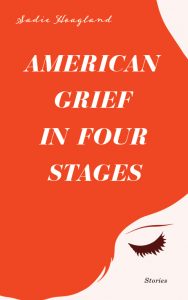Desperate Times, Desperate Measures: How Innovative Use of Language Can Serve to Discover New Ways of Communicating Difficult Topics
By Sadie Hoagland
 In his Nobel Prize acceptance speech, Gabriel García Márquez referenced his work as the literary expression of an “outsized reality… a reality not of paper, but one that lives within us and determines each instant of our countless daily deaths.”
In his Nobel Prize acceptance speech, Gabriel García Márquez referenced his work as the literary expression of an “outsized reality… a reality not of paper, but one that lives within us and determines each instant of our countless daily deaths.”
He was referring to, and listed in his speech, the many atrocities, wars, and coups that were taking place in Latin America at the time. In a later interview, he wrote that “surrealism comes from the reality of Latin America,” and made abundantly clear that what we chose to label “magical realism,” was for him only a way of expressing the “sorrow and beauty” of his homeland.
Today, lots of writers adopt magical realism, and readers enjoy it without necessarily any awareness that this innovation in writing was born in violence and political turmoil.
There are many, many writers who chose to break with tradition in their writing when they are writing about what they feel is “inexpressible.” In particular, experiences of historically marginalized people have required a need to disrupt the majority’s language and narrative structure in order to get at their experience.
Why, as many postcolonial subjects and scholars have asked, use the language of colonizer to get at the experience of the colonized? These texts that re-center culture through literary innovation are writ large in our literary history, from Junot Diaz’s The Brief and Wonderous Life of Oscar Wao to Toni Morrison’s Beloved.
And then there’s women writers. In my creative writing workshop last year, a student very matter-of-factly told a female student to take all her adverbs out of her story. She had been taught that that was what good writing was. And she’s not the only one. Adverbless, short, active sentences. Like Hemingway. Like Carver. Like a man. Publishing likes writing traditionally associated with masculinity, we are told in not so many words.
Studies have shown that women write longer sentences (and of course, I can’t resist a joke here: it’s because we hate periods!). There are many brilliant female theorists who have written about woman’s need for her own kind of expression, an écriture feminine, as Cixous writes and here I always think of the hypertext My Body by Shelley Jackson, a website text read by clicking on body parts and following hyperlinks down the rabbit hole. Or her project Skin, where she tattooed one word each of a 2,095 word story on 2,095 volunteers so that her work lives, breathes, and disseminates. She writes: “As words die the story will change; when the last word dies the story will also have died. The author will make every effort to attend the funerals of her words.”
What I think all the above examples demonstrate is that who we are as writing subjects, and what we are writing about, drastically affects the kind of writing we do. And many innovations in literature, from Garcia Marquez to tattooed stories, are reflections of experiences that seem outside of the norm: “outsized realities.”
When someone dies in our culture, we say to the bereaved “I’m sorry.” And this feels, as we know as we are saying it, drastically inadequate. Sometimes it seems so insufficient that people chose to say nothing at all (which is worse, by the way). “How you holding up?” seems stupid even as it comes out of our mouths, and my least favorite, “God only gives you what you can take.” We have no formal leave policies for those grieving, and expect them to move on in silence, to be a survivor by surviving. In short, our culture sucks at this.
When writing my short story collection, American Grief in Four Stages, I didn’t feel like I could use the above empty language, the clichés that surround death to get at the truth of grief and trauma. My characters were all dealing with tragedies that pushed the outer limits of their experience, and their ability to express that experience.
Describing a little brother’s suicide, a cancer diagnosis, or a sister’s murder is not easy. I wanted to use language that showed their desperation to get at this experience, to provide it with structure or a logic which, in the end, is of course an impossible task. While one narrator reaches into surrealistic metaphor (electric birds) to describe both her mother’s cancer and now her own, another insists that she can narrate past the experience of her sister’s violent death.
With plans, lists, and activities she attempts to steam roll her family into another, easier time: “In fact we had to launch an intensive Future-Talk campaign, initiated by me…. we threw ourselves wholeheartedly into a timespace that had not yet arrived, but that was full of griefless light.”
And yet even when the loss catches up with her in the end, she tries to hide her devastation with obtuse language: “I did know, for the first time—with wet-faced convulsions in reference to all those years together, my god all that accumulated proximity of her-near-me and all that siblinial, road-tripian language of which I was the last remaining speaker…that I would never see her again.”
This narrator’s posturing, at once defensive and aggressive, reveals both her youth but also the unspoken truth about trauma and tragedy: there is often no way to explain it, to fully recover or accept it, so any approach is as valid as any other.
These stories were not always easy to write; not only are they tackling difficult subjects, but also some readers bristle at the extreme tone and language moves (e.g. “If I knew why my little brother killed himself then, man, I’d be rich.”). But some pain is extreme, and the silence can be overwhelming. I wanted to speak both into and out of this silence, and to do this I needed a loud voice. These are not every-day experiences, and I felt that the writing about them should not be every-day, either. As García Márquez said to finish that beautiful Nobel speech:
“Face to face with a reality that overwhelms us, one which over man’s perceptions of time must have seemed a utopia, tellers of tales who, like me, are capable of believing anything, feel entitled to believe that it is not yet too late to undertake the creation of a minor utopia: a new and limitless utopia for life wherein no one can decide for others how they are to die, where love really can be true and happiness possible, where the lineal generations of one hundred years of solitude will have at last and forever a second chance on earth. “
—
 Sadie Hoagland is the author of American Grief in Four Stages, a collection of stories that explore the inability of our culture to communicate grief, or sympathy, outside of cliché. Her novel, Strange Children, is forthcoming from Red Hen Press. She has a PhD in fiction from the University of Utah and an MA in Creative Writing/Fiction from UC Davis.
Sadie Hoagland is the author of American Grief in Four Stages, a collection of stories that explore the inability of our culture to communicate grief, or sympathy, outside of cliché. Her novel, Strange Children, is forthcoming from Red Hen Press. She has a PhD in fiction from the University of Utah and an MA in Creative Writing/Fiction from UC Davis.
Her work has appeared or is forthcoming in The Alice Blue Review, The Black Herald, Mikrokosmos Journal, South Dakota Review, Sakura Review, Grist Journal, Oyez Review, Passages North, Five Points, The Fabulist, South Carolina Review and elsewhere. She is a former editor of Quarterly West, and currently teaches fiction at the University of Louisiana at Lafayette where she also lives with her family, and they do their best to eat beignets whenever they can. You can visit Sadie online at sadiehoagland.com.
American Grief in Four Stages is a collection of stories that imagines trauma as a space in which language fails us and narrative escapes us. These stories play with form and explore the impossibility of elegy and the inability of our culture to communicate grief, or sympathy, outside of cliché.
One narrator, for example, tries to understand her brother’s suicide by excavating his use of idioms. Other stories construe grief and trauma in much subtler ways—the passing of an era or of a daughter’s childhood, the seduction of a neighbor, the inability to have children. From a dinner party with Aztecs to an elderly shut-in’s recollection of her role in the Salem witch trials, these are stories that defy expectations and enrich the imagination. As a whole, this collection asks the reader to envisage the ways in which we suffer as both unbearably painful and unbearably American.
Category: On Writing

























